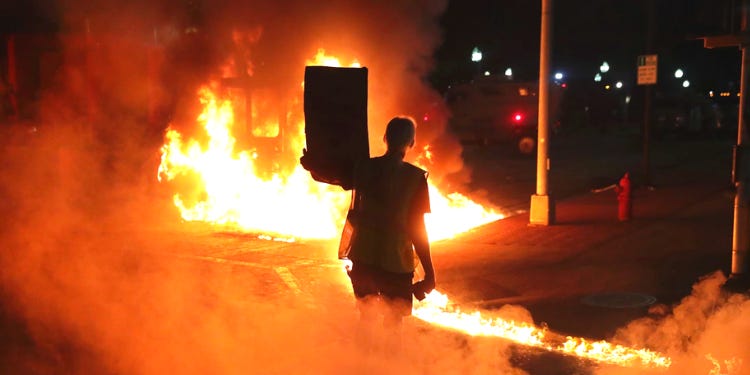In my column last week, I argued that the protest violence we’ve seen across major cities this year doesn’t present a logical case for re-electing Donald Trump. After all, though he’s not to blame for what's happening, the looting, vandalism, and assaults in places like Portland, Seattle, Chicago, and New York City, have taken place during his watch.
“Saying that we need Trump in office to stop something that’s actually happening while he’s in office doesn’t seem to make a lot of sense," I wrote in the column.
My broader argument was that this type of thing is a local issue, for which local elected leaders (Democrats in these cases) should be held accountable for their ineffectiveness in dealing with the violence. There’s simply not a whole lot a President of the United States can realistically, definitively, and unilaterally do to end the nightly flare-ups, beyond rhetorical appeals to people’s better sensibilities (something Trump is notoriously bad at).
Still, when it comes to politics, a picture is worth a thousand words. Trump and his supporters have made protest violence a key theme of the president’s re-election bid, portraying the horrific, anarchic images we’ve seen on television and the Internet (including overnight in Kenosha, Wisconsin) as a “preview” of what Americans will experience much more of, should Joe Biden (who they claim is a “puppet” of the far left) be elected in November.
Logical claim or not, the Democrats knew this was Trump’s play. They had to know how terrible all the videos of beatings, buildings and cars on fire, and store looting look to a lot of Americans. They had to have seen the poll numbers showing that this is an issue a lot of Americans (including likely voters) are concerned about.
Yet, at last week’s Democratic National Convention, the topic was essentially ignored.
Sure, some prominent Democrats had previously (and pretty generically) denounced the violence. Back in June, for example, Biden himself said in an interview, “There’s no place for violence or destruction of property. Peaceful protesters should be protected, and arsonists and anarchists should be prosecuted.”
It was the right take, but the sentiment has been put forth cautiously and infrequently by Democratic leaders. Their attention to the issue has been glaringly disproportionate with the public anxieties that surround it, which in turn leaves a perception of political and even legal indifference.
Democrats had a huge opportunity last week, at their televised national convention, to right their party's ship on this issue. Instead, they let that ship quietly sink.
Maybe it was done, as many have suggested, out of fear of offending the left-wing base (of which many are empathetic to the racial-injustice motivations spurring the violence). Maybe Democrats didn’t want to bring more attention to the fact that these lawless-looking cities are governed by leaders from their own party.
Either way, it was a big mistake. And by sidestepping the topic entirely, Democrats also passed up their best opportunity yet to argue that Trump’s temperament and divisive instincts make him uniquely unqualified to address the societal anger at the root of the violence. They could have even reinforced the point that the chaos has taken place under Trump’s tenure, and that there is no reason to believe things would get any better if Americans gave him four more years in office.
Blowing off those opportunities was a rather large political concession — one that Republicans, at their own convention this week, have taken advantage of.
By using their airtime to focus heavily on the issue, Republicans have put themselves in a better position to frame it. And no matter how unreasonable and illogical their arguments may be in presenting a second Trump term as an effective prescription for the problem, Democrats are now relegated to rebutting the GOP narrative from a smaller stage, and with less momentum.
The dynamics may change when the presidential debates start in a little over a month, but for now, the advantage — at least on this issue — goes to Trump and the Republican party.
—



